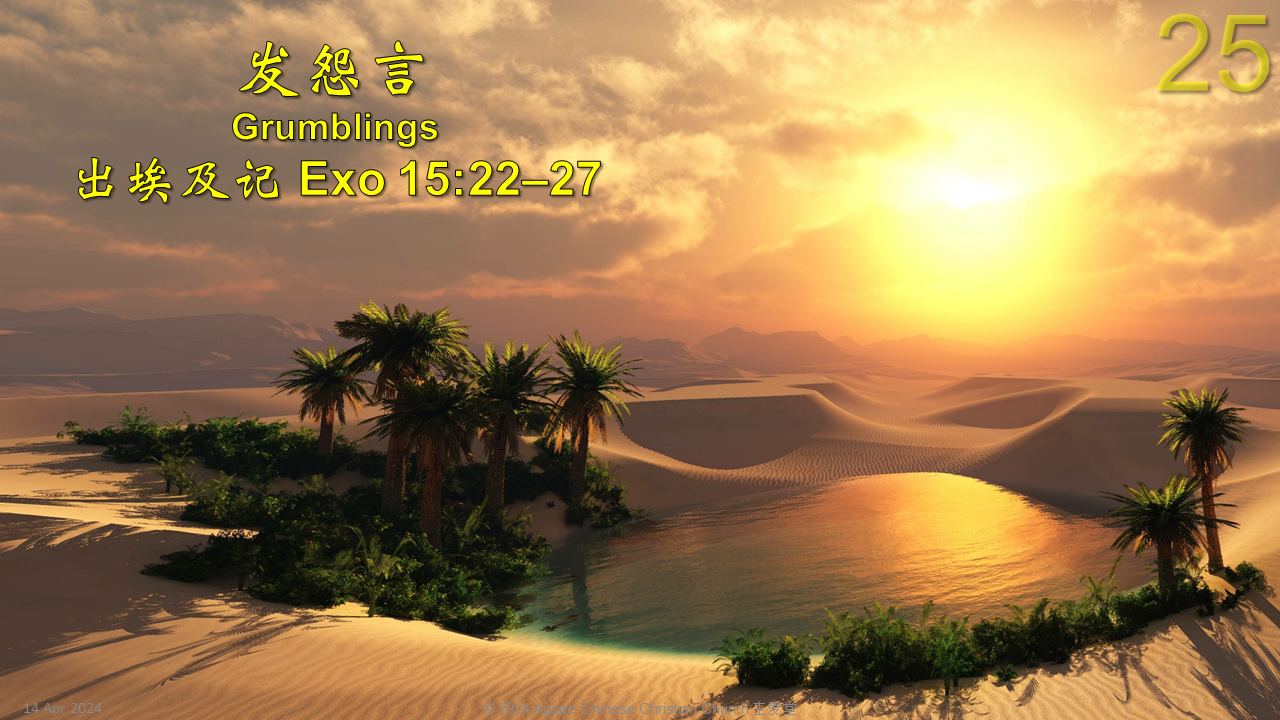发怨言 Grumblings
出埃及记 Exo 15:22–27
Remember these points
I put these points at the top of my sermon-prep template to remind myself every week:
- Show that main point of passage relates to Jesus and his saving work
- (1 Cor 1:18) A truly gospel-centred message will not be acceptable in a synagogue or mosque
- Did I proclaim the gospel as the headline news of the sermon, rather than as a “by the way…”?
- Unbelievers are called to repent, believe, and be saved
- Believers are encouraged to abandon their old self, renew their minds, put on the new self in Christ
- Preach simple sermons, so that God’s people can see Christ more clearly and love him more dearly
News
T
Hook

What’s happenning with these kids and the lady?
They’re grumbling. Upset about something.
Have you grumbled before. Think back as to why you did that, what caused it, how did you feel?
Have you ever grumbled against your parents, children, boss, profs, church leaders, or even God?
Have you ever been the target of grumbling? How did it feel? What did you do about it?
Did it feel better after you grumbled, even though your situation didn’t change much?
If you find yourself in the same situation again, what would you suggest instead of grumbling?
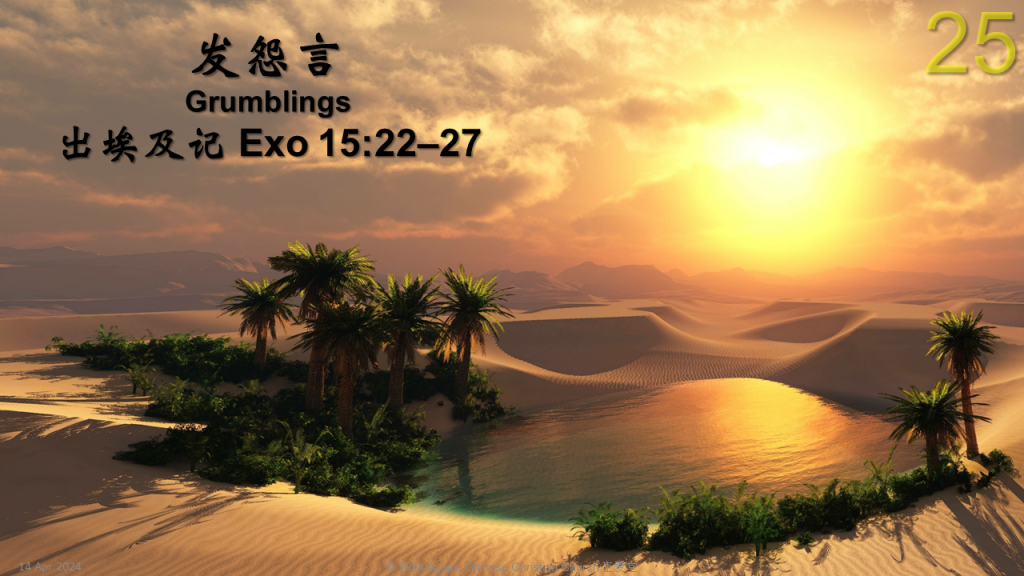
Passage
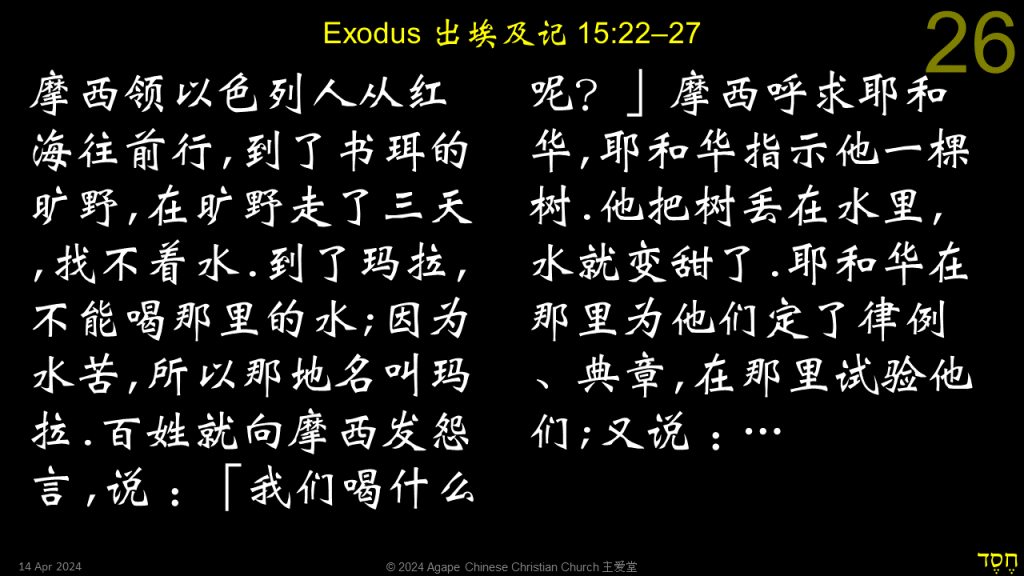

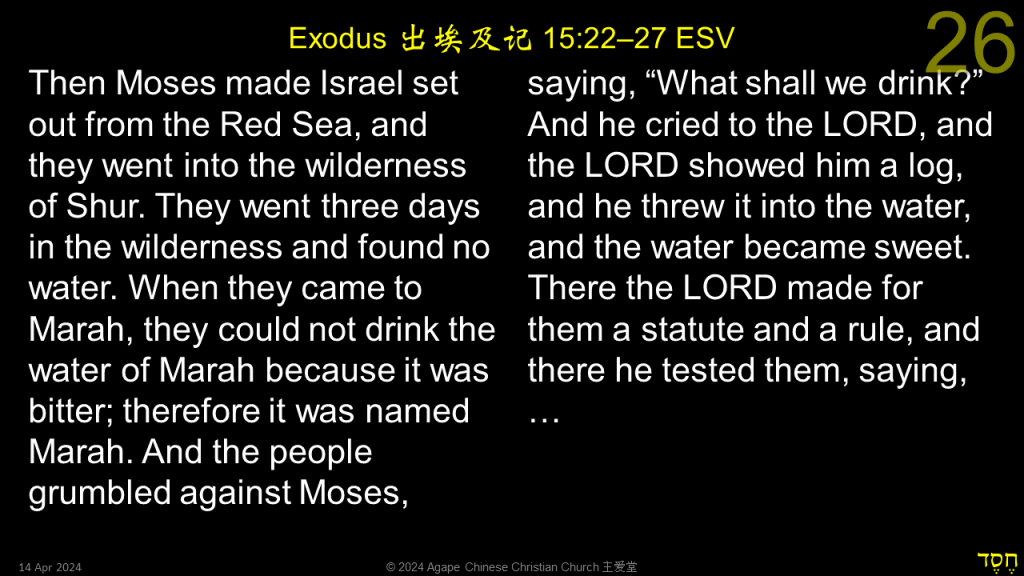

Outline

Section 1
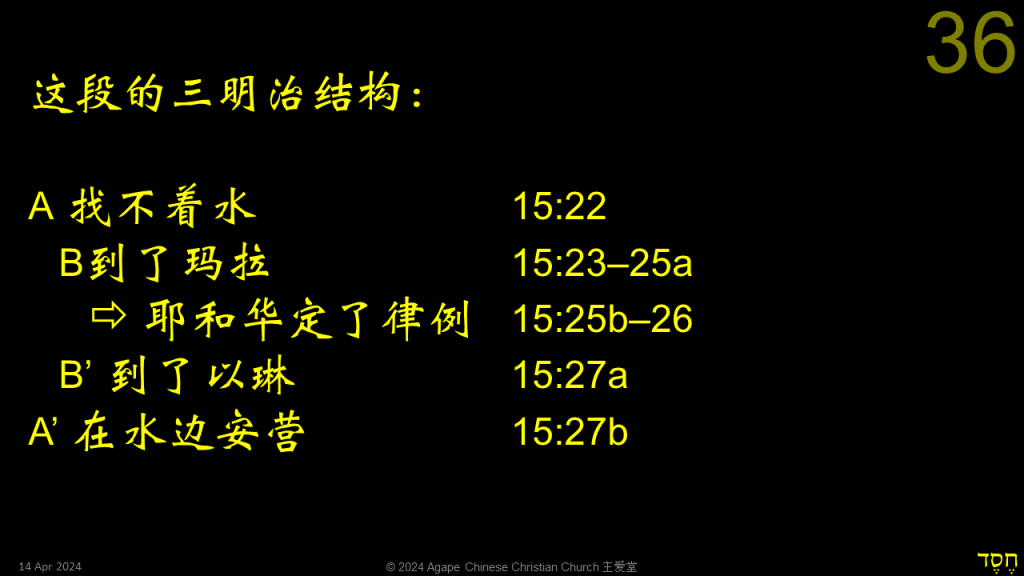
The structure is again chiastic, with the centre being Exo 15:25b–26, the commands that YHWH gave the Israelites while they grumbled.
Section 2 <40–44>
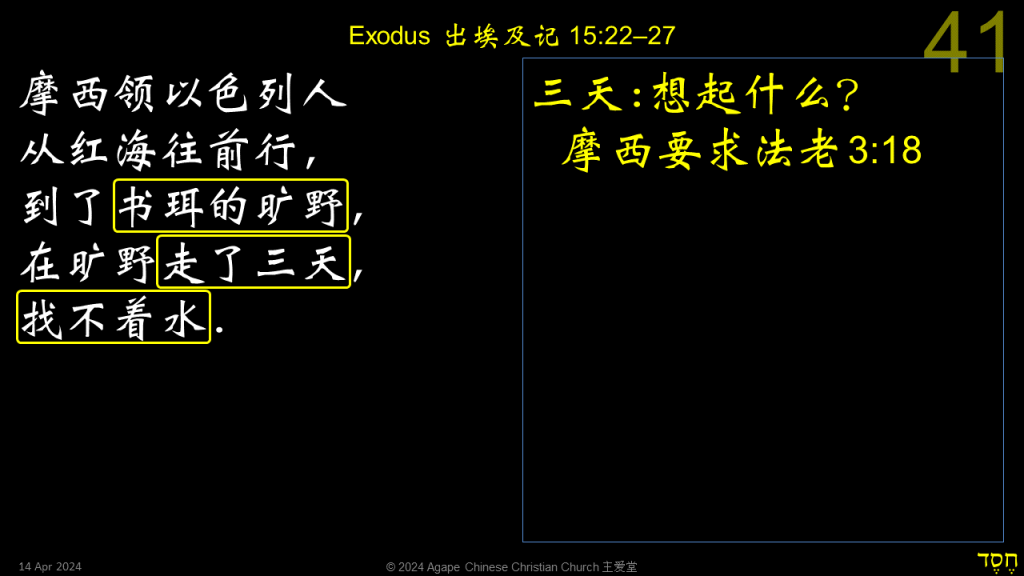
The wilderness of Shur. Lots of opinions as to where that is, or where Elim is, how far apart Shur is from Elim, etc.
The “three days” reminds us of Moses asking Pharaoh (way back before the start of the plagues, Exo 3:18) to release the Hebrews so they can go three days into the wilderness to worship YHWH.
No water. Three days without water would be at the limit of survivability. So we can understand the people are desperate.
Section 3 <45–49>
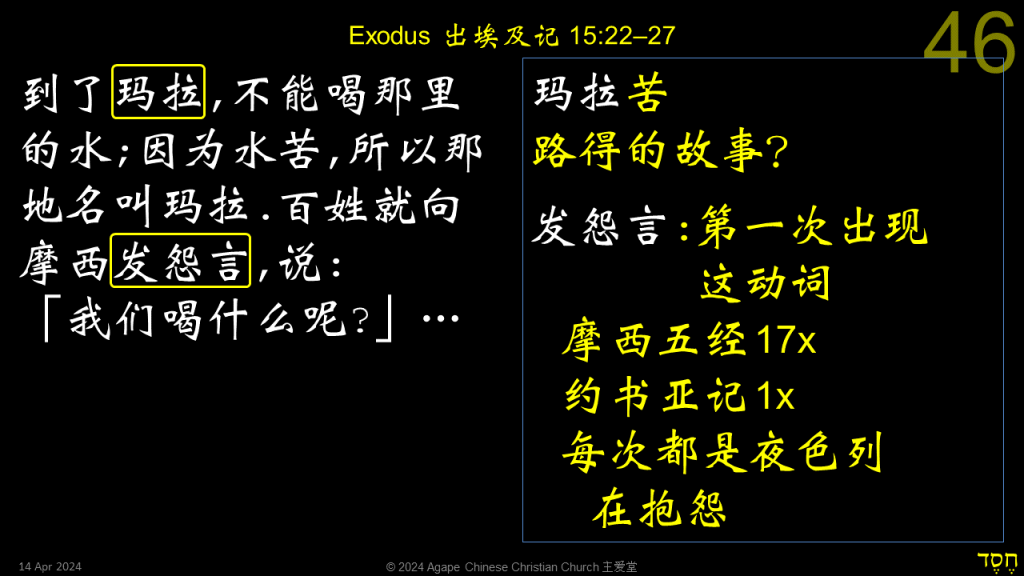
Marah, from the Hebrew meaning bitter.
Remember the story of Ruth? When Naomi (the mother in-law of Ruth) returned to Bethlehem with Ruth, she told the people not to call her Naomi, but call her “Mara,” because YHWH has treated her bitterly (Ruth 1:20).
To grumble (verb) appeared 18x in the OT, here is the 1st time. 17x in the Pentateuch, 1x in Joshua (Josh 9:18)
Every single time it’s used to describe the grumbling of the Israelites against their leaders. What a group!

Moses cried out to YHWH in response to the group’s grumbling.
Do we look to God when people grumble against us? This question is particularly for the parents, bosses, church leaders, etc.
YHWH showed Moses a tree. The Hebrew can be translated tree or log (so depending on the Bible translation, you see one or the other).
What does the tree remind us of?
What comes to mind when we see “planting a tree”?
God planting trees in the Garden of Eden, tree of life, tree of knowledge of good and evil: Gen 2:8–9
Tree of life in the New Jerusalem, with leaves to heal the nations: Rev 22:2
In the song of Moses, Exo 15:17, “You will bring them in and plant them on your own mountain, the place, O LORD, which you have made for your abode, the sanctuary, O Lord, which your hands have established.”
The tree (the cross) where they crucified Jesus (as described in 1 Pet 2:24).
When the wood was thrown in, the water became sweet (drinkable).
There are all sorts of speculations about where this this place is.
People were looking for lakes in the Sinai area where the water is undrinkable (bitter), and looking for any tree or wood from the area that might have some ability to purify water to make it drinkable.
There’s no need for such speculation. Just believe that it’s a miracle from God. No need to look for naturalistic explanations.
Question: If it was you (say someone grumbled against you), would you have given the person what he/she wanted?
YHWH made the water drinkable, we can see his mercy and grace.
Section 4 <50–54>

YHWH made rules and commandments for them.
Note the sequence: they were saved out of Egypt, they were saved by biiiiiiig miracle of crossing the Red Sea, they were satisfied with drinkable water, and only then, did God give them his commands.
What do we learn from this: Salvation comes first, then the law.
We’re not saved by our efforts to keep the law (and we all know none of us can keep it), but by God’s grace.
Once we are saved, we express our thanks by obeying God (the life-long process of sanctification).
“And there he tested them” (Exo 15:25). God brought them to Marah, where they found water, but it was undrinkable. This was a test.
What do you think the test is about?

These are the 4 things YHWH commanded:
- Listen to the voice of God
- Do what is right in God’s eyes (certainly not in our eyes)
- Listen (and obey) his commandments
- Keep all his statutes
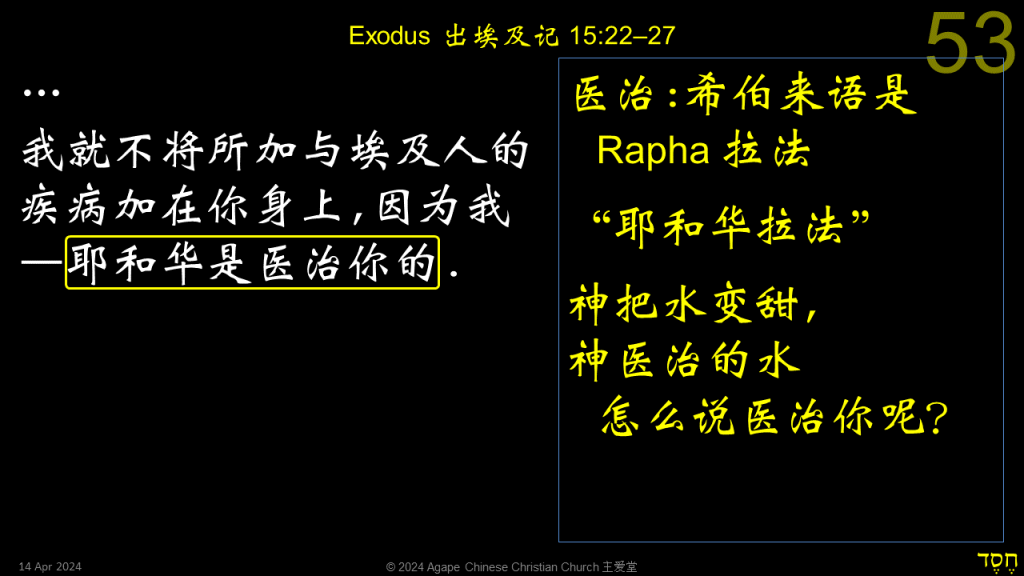
Do that, and all the diseases God brought on the Egyptians will be kept away from the Israelites.
YHWH said he heals them. The Hebrew for “to heal” is רֹפְאֶֽ (Rapha, 拉法 in Chinese). It appeared 69x in the OT, always meaning healing or related to healing.
This is another name of YHWH, another aspect of his character that he has revealed to us.
Interesting note: YHWH healed the water (made it drinkable), not the Israelites. So in what sense did God healed them? We’ll come back to this in the “So What” section.
Section 5 <55–59>
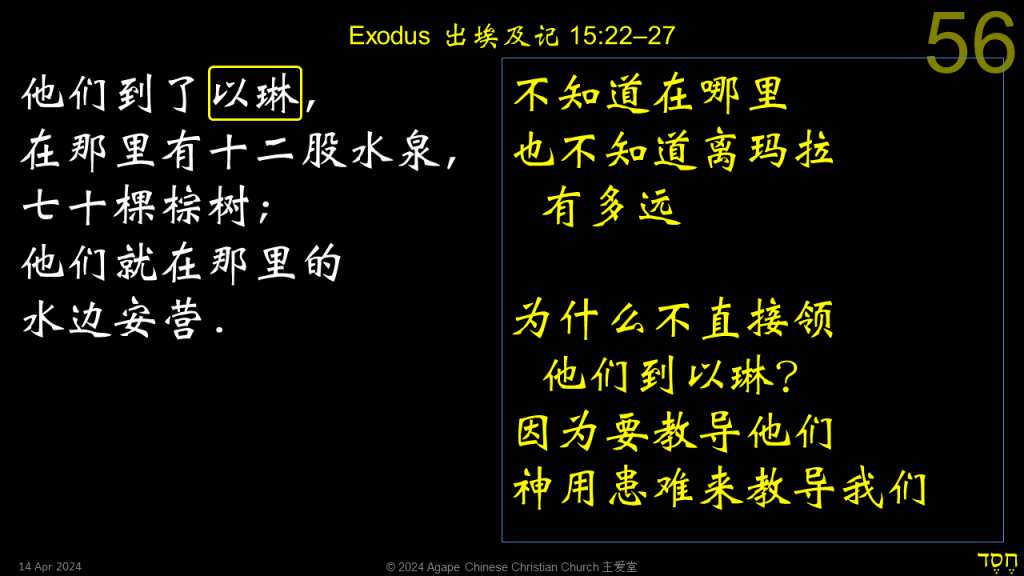
Again, we don’t know where Elim is, or how far it is from Marah.
Why didn’t YHWH just lead them straight to Elim? Because he wanted to test them.
But test them on what? To teach them to trust God. God is able to provide, to heal. They have to learn how to obey.
God uses adversity to test/teach his people’s loyalty.
The response to adversity must be prayer to God. He can turn bitter into sweet, bad into good, death into life.
与我有什么关系? So What?
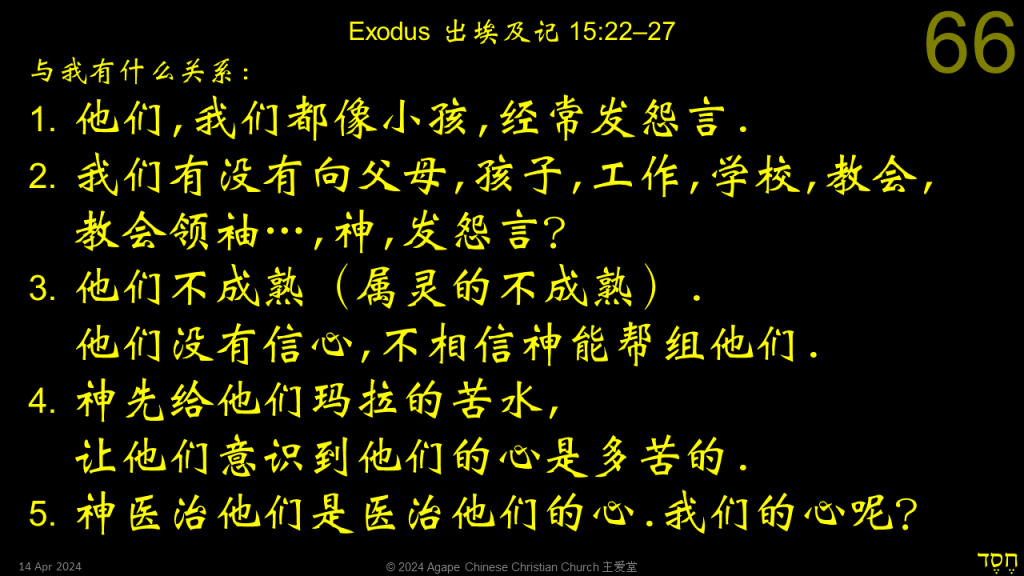
- They, us, we’re all like little children, always grumbling.
- Did we grumble against our parents, children, work, school, church, church leaders, …, God?
- They weren’t mature (spiritually), they have no faith, didn’t believe that God can help them in any situation.
- God led them first to Marah, where the water is bitter, to let them know how bitter their hearts are.
- When God said he healed them, what he healed was their hearts. What about ourselves?
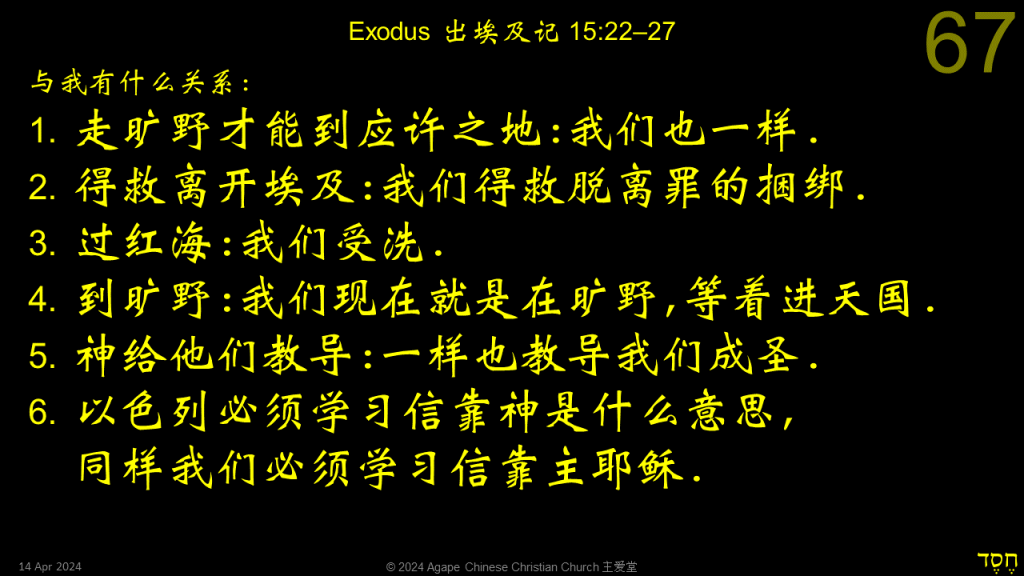
- They had to go through the wilderness before coming to the Promised Land. The same for us.
- They were saved from Egypt: We are saved from the bondage of sin.
- They crossed the Red Sea: We were baptised.
- They came to the wilderness: We are now living in the wilderness, waiting to get into the Kingdom of God.
- God gave them lessons: Same way, God gave us lessons to sanctify us.
- Israel must lean what it means to trust in God; similarly, we must learn what it means to trust in the Lord Jesus.

